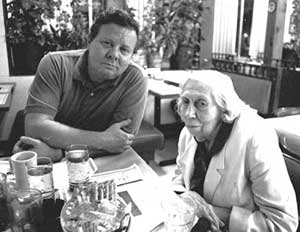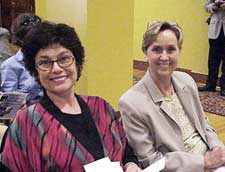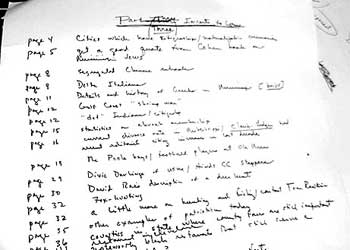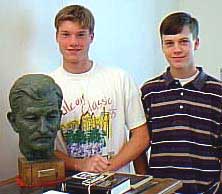Major Works
- Taps (published posthumously by JoAnne Prichard, Morris’s wife) (2002)
- Shifting Interludes: Selected Essays (published posthumously by Jack Bales, editor) 2002
- My Mississippi (2000)
- My Cat Spit McGee (1999)
- The Ghosts of Medgar Evers: A Tale of Race, Murder, Mississippi, and Hollywood (also a movie) (1998)
- My Dog Skip (made into a movie) (1995)
- Prayer for the Opening of the Little League Season (1995)
- New York Days (1993)
- After All, It’s Only a Game (1992)
- Terrains of the Heart and Other Essays on Home (1991)
- Faulkner’s Mississippi (1990)
- Homecomings (1989)
- The Courting of Marcus Dupree (1983)
- Always Stand in Against the Curve, and Other Sports Stories (1983)
- James Jones: A Friendship (1978)
- Good Old Boy: A Delta Boyhood (made into a movie) (1974)
- The Last of the Southern Girls (1973)
- Good Old Boy and the Witch of Yazoo (1971)
- Yazoo: Integration in a Deep Southern Town (1971)
- North Toward Home (1967)
- Foreword to Wyatt Waters, Another Coat of Paint: An Artist’s View of Jackson, Mississippi
Willie Morris: A Biography
by Ben Beavers (SHS)
One of Mississippi’s best-known contemporary authors is Willie Weaks Morris. Morris, the son of Henry Rae and Marion Weaks Morris, was born in 1934 in Jackson, Mississippi. He moved to Yazoo City, Mississippi, when he was six years old. At Yazoo City High School, he was editor of the school newspaper and played football, basketball, and baseball. Willie Morris was voted most versatile, wittiest, and most likely to succeed by his high school classmates. He graduated class valedictorian.
After graduation from high school , Morris headed for Austin, Texas. At the University of Texas, he spent many long hours writing for the Daily Texan. In 1956, Morris earned his bachelor’s degree and won a Rhodes scholarship. He spent the next three years of his life reading modern history at New College, Oxford University in England. He married his first wife Celia Ann Buchan in 1958 and she gave birth to their son David Rae Morris in 1959 while they lived in England.
In 1960 Willie Morris returned to the U. S. and was hired as editor of the Texas Observer, a weekly political newspaper published in Austin. However, he resigned from this position in 1962 because he disliked the fast pace of the work and the lack of a support staff. After a short time in graduate school at Stanford University, he moved to New York City where he landed a job as editor of Harper’s Magazine. He was awarded his M. A. by Oxford University in 1966. In 1969 Willie and Celia divorced. In March 1971, Morris resigned from Harper’s because of a dispute with the owner. After his resignation, Morris started his career as an independent writer.
Morris’s writings deal with his personal experiences in the the South. His best known pieces of literature include North Toward Home, Yazoo, Good Old Boy, My Dog Skip,and The Last of the Southern Girls. Three of his books have been made into movies: My Dog Skip, The Ghosts of Medgar Evers, and Good Old Boy. Willie Morris writes of the people, the traditions, and the problems of the American South through his own experiences.
JoAnne Prichard Morris, who was a teacher when Morris met her and who was later executive editor of the University Press of Mississippi, married Willie Morris in 1990. She has published his Taps posthumously. Willie Morris died in September of 1999 of a heart attack. His works have inspired writers and set a precedent for generations of authors to follow.
JoAnne Prichard Morris Visits Starkville
On April 18, 2002, JoAnne Prichard Morris, second wife of the late Willie Morris, spoke in Starkville, Mississippi, at Mississippi State University about the writing techniques of her husband and his book My Mississippi, which is a collaboration of Willie Morris and his photojournalist son David Rae Morris. She also told some personal anecdotes of their life together.
Reviews
A Review of Good Old Boy
by Ben Beavers (SHS)
Good Old Boy, by Willie Morris, is a novel for Morris’s son David to explain to him what it was like to have grown up in the deep South in the 1940’s. It is filled with the pranks and adventures of Willie and his childhood friends. This book effectively mixes fantasy and reality of his boyhood in the Mississippi Delta country.
As he begins his book, Morris sets the scene for his childhood stories by giving the reader a glimpse of the book’s setting: Yazoo City, Mississippi. Located on the Yazoo River, the town has its share of stories of days gone by including the well-known legend of Casey Jones to the story of the witch who burned down Yazoo City. Morris draws the reader into the legends that helped shape the imaginations of a group of childhood friends. Willie’s first recollection of a “good old boy” was a day in the first grade when his mother forgot to pick him up from school. Bubba Barrier offered to make the long walk across town with Willie. Facing their fears together, they made the journey hand in hand and were best friends through many adventures.” My friends were good old boys, and good old boys never let you down”( Morris 33). Names of friends like Billy, Spit, Muttonhead, and Henjie draw the reader from one story to another. Willie even admits to admiring one “good old boy” who was a girl–Rivers Applewhite. Good Old Boy is filled with the stories of these friends and the adventures. Morris tells of one occasion when Spit Gee and Billy Rhodes broke into Old Man Blane’s house. According to Willie, this man was the meanest man in the whole county. Spit and Billy left a dead dog, a dead possum, and a dead buzzard in his refrigerator.
On another occasion Willie and friends had a case of bourbon sent to the Tuesday meeting of the Baptist ladies who believed that liquor came from the Devil himself. The “good old boys” watched from the bushes while Harry, the delivery boy, was attacked by the ladies. The friends, the pranks, the adventures are all part of the images Morris recreates of his childhood days.
One character that played a dramatic role in Willie’s life was his dog Skip that, according to Willie, was the best dog he ever owned. No other dog could compare with this one. Morris would carry on conversations with him, take him hunting, play football with him, and even let him drive a car.
Good Old Boy was written in response to the questions Morris’s son asked about his boyhood days in the Delta. As a small child I can remember asking my father what it was like when he was growing up. I always was curious about what he was doing when he was my age and what he and his friends did. My dad’s stories about his friends and their adventures are some of my favorites. Perhaps Morris’s recollections of his boyhood days in his book, Good Old Boy, are also favorites of his son David.
Morris died in the fall of 1999 of a heart attack. My Cat Spit McGee was published just after his death, and the movie My Dog Skip, based on his book of the same name, was released in January 2000. Two other books, Taps and Shifting Interludes, have also been published since his death.
A Review of My Dog Skip
by Trey Templeton (SHS)
My Dog Skip by Willie Morris was published in 1995. It tells of the escapades of Willie and his fox terrier growing up in a small town in the south in the 1940’s. Skip (Morris’s dog) and Willie, the main characters , are faithful companions during Morris’s childhood. Morris taught Skip to do many things. “I cut the laces on a football and taught Old Skip to carry it in his mouth,” Morris says. “I instructed him how to move on a quarterback’s signals, to take a snap from center on the first bounce, and follow me down the field.” (My Dog Skip 9,10).
One day, Henjie, Pee Wee, and Muttonhead (Morris’s friends) dared Skip and Willie to camp out in a tent in the local cemetery with an $8.50 bet. The two accepted the dare and pitched their tent in the scariest part of the cemetery. In the middle of the night Skip woke up in a frenzy. He could hear voices in the cemetery. The two checked out the voices and, sure enough, three drunk “rednecks” in a pickup truck were digging up a grave. Suddenly, Skip began to bark and the three grave robbers found the cemetery campers. The three grave robbers proceeded to get Morris drunk. Morris explains, “Somehow my back was propped against a tombstone, and Skip was sound asleep with his head in my lap. I glanced around. The pickup was gone, there were empty beer bottles all over the place.” (My Dog Skip, 67). At the conclusion of their adventure, Morris and Skip also collect their $8.50.
Sometimes Skip would perform amazing feats for the local townspeople (with the help of Morris). “Cruising through the fringes of town, I would spot a group of old men standing around up the road. I would get Skip to prop himself against the steering wheel, his black head peering out of the windshield, while I crouched down under the dashboard.” Morris continues, “Slowing the car to 10 or 15, mph., I would guide the steering wheel with my right hand while Skip, with his paws, kept it steady. All the men would shout, ‘Look at that ol’ dog drivin’ a car!.'” (My Dog Skip, 11).
As Willie’s high school years came to an end, his relationship with Skip began to change. Skip continued to do everything with Willie, but Skip was growing old and wasn’t able to play like he had in his younger days. Willie went on to college in Texas and won a scholarship to England. When Willie left for England, that was the last time he saw Skip. A month after Willie said good-bye to Skip, Willie received a phone call from his Daddy announcing that Skip was dead. Morris says that Skip was like a brother to him. Morris also exclaims, “The dog of your boyhood teaches you a great deal about friendship, and love, and death.” (My Dog Skip, 118). Another quote from this book that really touched me was at the end when Morris somberly says, “They buried him under our elm tree, they said — yet this was not totally true. For he really lay buried in my heart.” (My Dog Skip, 118).
I personally enjoyed this book and highly recommend it for pleasure reading. It was filled with laughter and adventure as well as heart-warming stories.
A Review of After All It’s Only A Game
by Greg Gaillourakis (SHS)
After all, It’s Only a Game by Willie Morris is a book compiled of short stories about his experiences with sports. Morris as an athletic youth had a passion for sports. He took great pride in sports, and it came to be a great focal point in his life. The first story in this book is called Blood Blister. During high school basketball days, Willie sat on the bench and saw little playing time. He got in the game once in a while at the end. His coach, Asphalt Thomas, was a stern man and demanded the best from his players. He pushed the team to new heights and made them better physically and emotionally. During the season, one of the starting players got hurt. Asphalt immediately put Willie in his place. Morris then began playing every night. As he played, Willie began to form a blood blister on the bottom of his foot. Every night he would complain of the pain he endured, but Asphalt just told him to be a man and play with the pain. As the season rolled on, Fisk’s Landing, which was Willie’s team, got to the state playoffs. Fisk’s Landing did very well during the tournament and ended up in the championship game. In the final game, Fisk’s Landing had to play a very powerful team from Lutherville. Lutherville had the best player in the state, and Willie had to go against him. There he was, blood blister and all, defending the premier player in the state. Willie gave a valiant effort, withstanding the pain of his foot, but fell short of his goal. His team lost, but he learned a lesson. He now looks down at his foot and sees the scar that the blister made. It brings back memories of the good old days of high school basketball.
The next story is called The Phantom of Yazoo. In this story, Willie finds an old short-wave radio which broadcasts baseball games from across the nation. His town has its own station and announcer and also broadcasts games. The only difference is that the local broadcaster does the play-by-play hours after the game has begun. Willie receives all the action on his short-wave radio as it is happening. He knows what is going to happen before the local announcer says it. Willie goes to the local diner and predicts the next play. People are amazed because they have no idea what is going on. He starts betting with his new found talent and makes some money. One day his dad comes home from work and listens to the radio. When Willie comes into the room and predicts the next play, his father is astonished and insists that Willie tell him how he knew that. Willie tells him that he has a short-wave radio and that he picks up the game earlier than the local announcer. His dad laughs and just keeps on listening.
The next story is Me and Ollie. This story is very short. It takes place in the 1950’s in an open field where Willie and some of his friends have set up a baseball diamond. There are some black children watching them play. Willie invites some of them to come and join them. One of the boy’s names is Ollie. He is the best one of the bunch– the fastest and hardest hitter. He and Willie begin to respect each other even though they are of different races. Thus they become friends and play a lot of baseball together.
Another story is called North Toward Starkville. It is about how Willie and his family came to Starkville to watch the game between Mississippi State and Ole Miss. Willie grew up hearing the legend of a man named Shortie Mac, who played for Mississippi State. He also had heard of a phenomenon named Charlie Conner of Ole Miss. When these two incredible players met in Starkville on the gridiron, Willie wanted to be there. His parents made the journey to Starkville to watch the game of the year. Morris was a State fan except when State played Ole Miss. As he and his family made their way to Scott Field, he could here the roar of the crowd. Ole Miss ended up winning the game, but Willie saw what he had come to see– Shorty and Charlie battling it out. He had lived to see this day when two of the best were on the same field.
The next story is called Cheerleaders versus Baton Twirlers. This story is short and debates the question: which is better, cheerleaders or baton twirlers? Willie was at a football game when he recognized some of the visitor’s cheerleaders. He went over to talk to them. They told him that they had been to a cheerleading camp and that there had been every sort of cheerleader there you could possibly imagine. They went on to describe how baton twirlers thought that they were better than cheerleaders. Willie just stood there listening and laughing at what the girls had to say. He didn’t have a preference for either; he just stood there laughing.
The final story is called The Fumble. The school superintendent had set up a game with Central High of Jackson to play Yazoo High in five years. Willie Morris would be a senior when this unthinkable occurrence would happen. The years and football seasons passed, and it was now time to play the invincible team from Jackson. They had beaten everyone. There was no way out. Yazoo’s captains, Bubba Poindexter and Hershell Meade, walked across the field. They had won the coin toss and decided to receive. The ball soared through the air. Bubba Poindexter caught it at his own five yard line. He started running up the field. He must have been possessed because he ran the ball all the way for a touchdown. The stands were quiet. No one could believe it. Jackson Central was trailing for the first time of the season. They couldn’t do anything with the ball though. At the end of the first half, it was 7-0. The ball wouldn’t cross either goal line during the third quarter. In the fourth, Yazoo’s starting half back got hurt. The coach yelled “Morris! Get in there!” He jumped off of the bench and ran to the huddle. There was a play designed especially for him. He ran it with brilliance. He had gained a crucial thirty-two yards. All of a sudden Yazoo scored again. It was now 14-0. Jackson, however, wasn’t great for nothing. They stormed back and got on the scoreboard. They were coming back. They scored again and tied the game at fourteen with under six minutes to play. Yazoo kept their composure. They worked the ball up the field. They were inside the twenty yard line with under a minute to play. Willie came into the huddle and received his instructions. the ball was snapped and pitched over to Morris. He ran up the sideline. All of a sudden from out of nowhere, he was hit. the ball sprang out of his hands and landed on the ground. His glory flashed before his eyes. There the ball was, yards from the goal line, and Jackson and Yazoo players all over it. The referee blew his whistle and the game was over. From that day on, Willie was known as “butterfingers.”
I enjoyed all of these stories. I like the way Willie Morris writes because it is easy to understand and interesting to read. It is also easy to identify with him. His stories are mainly about his memories as a child. I’m sure that when I get older, I will reflect back on my youthful days as does Morris. He brings out nostalgic memories that many people have probably forgotten. The story that I liked the most was The Fumble. As I read it, I got more interested as the story progressed. I have seen many things happen under pressure, so I can relate to this story. All of the stories were well written and bring back memories.
A Review of Terrains of the Heart and Other Essays on Home
by Lauren Hodge (SHS)
In Terrains of the Heart and Other Essays on Home, Willie Morris compiles a collection of his essays based around the theme of home. “This chord of homecoming seemed to be one of the very threads of my existence as a Southern-American of the Twentieth century, ” Morris says in the foreword (Terrains of the Heart, ix). Terrains of the Heart is filled with Morris’ childhood and adulthood experiences in the South.
The humorous side of Willie Morris shines through in some of his stories about the tricks he and his friends has played on unsuspecting souls. One day Gloria Jones, widow of Morris’ good friend novelist James Jones, comes to talk to Morris’ class. On the day of the Ole Miss-Alabama basketball game, Gloria is told that Morris has been appointed the Ole Miss basketball coach. Actually, Willie Morris has been invited by Warner Alford to sit on the bench with the players and coaches. That afternoon while Morris is in class, Gloria receives several phone calls, supposedly from players and others in the athletic department, asking for the diagrams of plays and the intrepid zone defenses. That night Morris wears an Ole Miss windbreaker and carries a clipboard. Several mock conferences with the Ole Miss substitutes are held. Morris goes into the locker room at half-time to give the team a pep-talk. People planted in the audience tell Gloria that he is doing “a swell job for a rookie.” A few days later when Gloria is back in New York she meets the novelist Winston Groom. When he asks how Morris is doing she replies, “Frankly, I’m a little worried. They’re k puone remaining and living far from home, Morris looks back each year to these fond memories.
Willie Morris writes Terrains of the Heart and Other Essays on Home from the first person perspective. Morris writes on the themes of home and homecomings, particularly as they relate to the South. He gives his readers a clear picture of what it is like to grow up in Mississippi. Included in his descriptions are the people who influenced his life.
Because I have lived in Mississippi all my life, I enjoyed reading Willie Morris’s account of the South of years ago. I especially enjoyed the essays which illustrated his sense of humor. Most of the essays are short, easy to read, and hold the attention of the reader. In conclusion, this is an excellent book for anyone interested in learning about the South and its customs.
Related Websites
- In Search of Willie Morris by Larry L. King, reviewed by John M. Coward
- Google Book Conversations with Willie Morris, published by Univ. Press of Mississippi, can be read here.
- Information about Shifting Interludes: Selected Essays by Willie Morris, edited by Jack Bales
- Reviews of Morris’s book My Cat Spit McGee on Amazon.com
- Excellent Reader’s Guide for Taps on Houghton Mifflin web site
- Great biographical information on University of Mississippi web site for Willie Morris
- Random House page for the book and movie My Dog Skip
Bibliography
- Metzger, Linda. Contemporary Authors. Volume 13. Gale Research Company: 1984, 378-379.
- Colby, Vineta. World Authors. 1975-1980. New York: The H.W. Wilson Company, 1985. .535-537.
- Morris, Willie. Good Old Boy. Harper and Row Publishers, Inc.,1971.
- Morris, Willie. My Dog Skip. Random House, Inc. 1995.
- Morris, Willie. Terrains of the Heart and Other Essays on Home. Yoknapatawpha Press, 1981.





